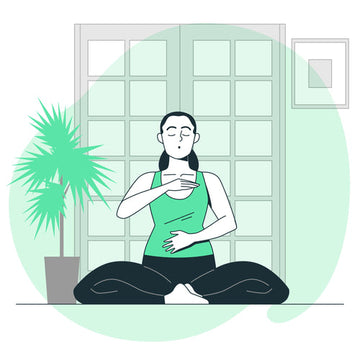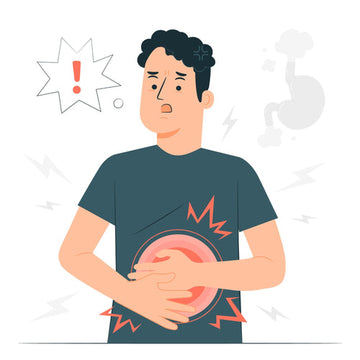You’ve probably heard about irritable bowel syndrome (IBS), as it affects a large number of people in the United States. But what do you actually know about the condition? Do you know what kind of symptoms you should be looking out for and how they are diagnosed and treated?
For many, IBS is dismissed as a general digestive malaise, something that is transient and presents with frequent gas and diarrhea. But it goes much deeper than that and can be a debilitating, uncomfortable, and embarrassing condition.
In the following guide, we’ll take a closer look at this condition, answering commonly asked questions and addressing the symptoms, causes, diagnostic methods, and treatments.
What is Irritable Bowel Syndrome (IBS)?
IBS is not a single syndrome, but rather it refers to a group of symptoms that impact the digestive system. It is known as a functional gastrointestinal (GI) disorder, so called because it changes the interaction between the brain and the gut.
It’s common, uncomfortable, and can have a number of causes.
How Common is IBS?
IBS is very common, much more so than you might expect. Estimates suggest that as many as 15% of the population suffers from this condition. However, many cases go undiagnosed, either because the symptoms are not severe enough to be a concern or because they are dismissed as something else.
It can also be an embarrassing condition, and many people are worried about discussing their symptoms with a doctor and undergoing potentially uncomfortable tests.
The condition typically presents before the age of 50 and is most common between the late teens and early 40s. It is roughly twice as common in women than it is in men. (1)
What Are the Types of IBS?
IBS is usually categorized into one of three groups depending on the type of bowel movements:
- IBS with Diarrhea (IBS-D) = Stools are typically loose and watery.
- IBS with Constipation (IBS-C) = Stools are usually very hard.
- IBS with Mixed Bowel Habits (IBS-M): There is a mixture of hard and soft/loose stools.
What Are the Symptoms of IBS?
Abdominal pain and cramping are some of the most common symptoms of IBS. The colon usually contracts more in people with this condition, and it’s these contractions that cause the cramping and discomfort.
Bloating and gas are also common, and many sufferers will either experience chronic constipation/diarrhea or will alternate between the two. Alternating between diarrhea and constipation can be a sign of something much more serious, so if you’re suffering from this symptom and haven’t been diagnosed with IBS, be sure to get checked out.
You may also notice a whitish tinge to your stools or feel like you aren’t able to fully empty your bowels.
What are the Causes of IBS?
Experts aren’t 100% sure what causes IBS, but they have some idea of the sort of things that can trigger or worsen the condition. These include:
- Difficult/stressful life events
- Bacterial infections in the digestive tract
- Mental health issues such as anxiety and depression
- Food sensitivities or intolerances
- Significant changes in the gut microbiome
- Genetic predispositions
What are the Triggers of IBS?
Everyone is different, and what triggers your symptoms might not trigger someone else’s. It’s important to pay attention to when the issues strike and make note of how you were feeling, what you were doing, and what type of foods you were eating.
Were you very stressed or anxious at the time? Did the symptoms appear prior to a performance, a flight, a job interview, or something else that makes you anxious? Or did they appear after you ate certain foods or consumed certain beverages?
How is IBS Diagnosed?
If you are having difficulties with your digestive tract, the first step is to contact your healthcare provider. Tell them about your symptoms and give them as much information as you can, including when they strike, what you were doing at the time, and how long they lasted.
They will look at your medical history, ask questions, and then perform a physical exam.
They can get a lot of information from this process, but they may wish to rule out other conditions before going any further, so they will likely arrange for stool and/or blood tests. X-rays can also be performed if needed. These tests are not designed to diagnose IBS as such, but rather they are used to rule out diseases that may present with similar symptoms.
Do You Need a Colonoscopy to See if You Have IBS?
As noted above, IBS is severely underdiagnosed and embarrassing and fear of testing could be one of the reasons behind this. Colonoscopies are not comfortable, so it’s understandable, but they’re not always used, either.
If your doctor can’t perform an accurate diagnosis based on the aforementioned tests, they may schedule a colonoscopy. It’s a very effective procedure that can tell them what they need to know, and while it’s more invasive than a questionnaire, it’s much less invasive than abdominal surgery. It’s also the preferred option to overlooking an illness and letting it develop.
A sigmoidoscopy may be performed. The main difference between a sigmoidoscopy and a colonoscopy is that the former examines the lower half of the colon while the latter examines all of it.
What Are the Treatments for IBS?
There is no single solution to IBS, as everyone responds differently and the type of treatment that works for you will depend on the severity of your symptoms, the type of symptoms, and the causes, as well as your general physiology.
You can discuss potential treatment options with your healthcare provider. Typically, they address one or more of the following treatment options:
Dietary Changes
Diet is a leading cause of IBS symptoms and one of the main triggers. Therefore, it should be your first port of call when seeking to get your condition under control.
The first step is to increase the amount of fiber in your diet. So, eat more fruits and vegetables, and ask your doctor about fiber supplements like ColoFlax Fiber Gummies and psyllium husk.
Fiber adds bulk to your stool and it also slows its passage through your digestive tract. If you’re struggling with frequent constipation, it will introduce size and hydration to the bowel and get things moving. If you have regular bouts of diarrhea, it could help to slow things down and give your digestive tract time to properly process everything.
Fluid intake is also essential, especially when you’re increasing your fiber intake. The recommendation is to drink at least 8 glasses of water a day, but you should increase your intake if you live in a very hot climate or spend a lot of time exercising or working in the heat.
If you take psyllium husk, drink more water. This is an essential step, as it’s possible—albeit rare—for the gelatinous bulk formed by the psyllium to dry out and become stuck.
Try limiting your intake of alcohol, caffeine, and refined sugars, and if you struggle with lactose intolerance or find that your symptoms are worse after consuming dairy products, reduce them or eliminate them entirely. There are plenty of milk and cheese alternatives on the market these days, so it has never been easier to go lactose-free.
The FODMAP Diet
If simple dietary changes don’t work, your healthcare provider may recommend something known as the FODMAP Diet. It stands for “Fermentable Oligosaccharides, Disaccharides, Monosaccharides, and Polyols” and refers to a class of carbohydrates that can be difficult for some people to digest. These carbs could be a trigger and removing them from your diet may relieve your symptoms.
High FODMAP foods to avoid include dairy, asparagus, green peas, onions, mushrooms, cherries, apples, peaches, pears, legumes, some meats, some cereals, and most types of sugar and sugar alternatives.
Low FODMAP foods include eggplants, tomatoes, zucchini, strawberries, kiwi fruit, pineapple, almond milk, eggs, nuts, and seeds. There are far too many foods to list here, but your doctor will provide more information.
Lifestyle Changes
Smoking can be a trigger for IBS. It is also behind a catalog of other chronic conditions, so it’s always best to stop or at least reduce your intake. It doesn’t matter how long you have been smoking—it’s always beneficial to stop and doing so could add years to your life.
Exercise helps too. You don’t need to hit the gym every evening or go for a run at the crack of dawn. Simply do what you can and keep progressing, whether that means walking to the shops instead of taking the car or doing some stretches at home.
Eating smaller meals is advised, and it’s also important to pay attention to your symptoms and record when, where, and—potentially—why they appear.
If the condition is caused by stress, then devote some time to your mental health and look after yourself more. Unplug from social media and the distractions of the web before going to bed. Rather than staring at your phone, read a book or have a long soak in the bath. Practice meditation, yoga, or Pilates, and make sure you’re getting plenty of sleep.
Medications
There are a number of medications that can be prescribed to people with IBS. The exact meds you receive will depend on the condition and its underlying causes.
For instance, if your doctor thinks that your IBS is caused or exacerbated by anxiety and depression, they may recommend anti-anxiety or antidepressant medications. If you struggle with chronic diarrhea, they can prescribe medications to slow things down. Likewise, if you’re dealing with bouts of constipation, they may prescribe short-term courses of laxatives.
On the supplement side of things, fiber obviously makes a big difference, but you should also consider taking probiotics. They add “healthy bacteria” to your gut and help to restore the balance.
Monitor the progression of your symptoms, look out for side effects, and report back to your doctor. Let them know what’s working and what’s not working and they can adjust your treatment accordingly.
Preventing and Managing IBS
Although IBS can be frustrating, uncomfortable, and even embarrassing, it’s something that can be managed. It may not go away completely, but through a process of trial and error, as well as dietary and lifestyle changes, you can learn how to keep it under control.
You won’t experience significant changes overnight, but if you persist with the aforementioned treatment options, you should notice some improvements within a few weeks. After several months, you could feel like a completely different person!






